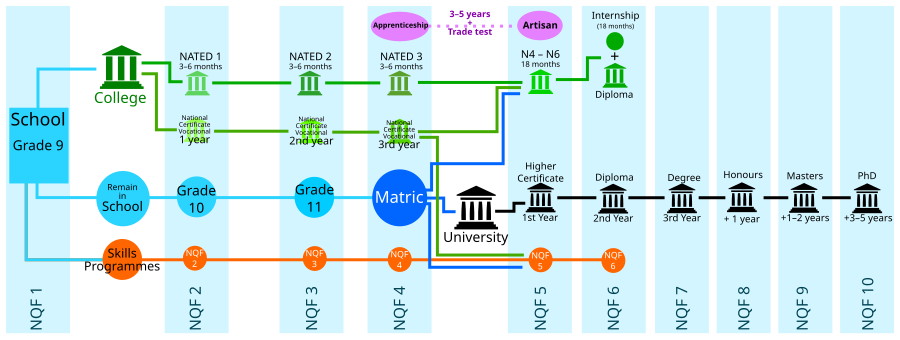The NQF is a set of principles and guidelines by which records of learner achievement are registered to enable national recognition of acquired skills and knowledge, thereby ensuring an integrated system that encourages lifelong learning.
The NQF consist of 10 levels divided into three bands; Levels 1 to 4 equate to high school grades 9 to 12 or vocational training, 5 to 7 are college diplomas and technical qualifications, 7 to 10 are university degrees

The NQF is a framework that classifies and organizes qualifications based on a set of criteria for specified levels of learning achieved. It aims to facilitate access, mobility, and progression within education, training, and career paths. The NQF consists of 10 levels, each representing a different qualification complexity and depth of knowledge.
NQF Levels Explained
- Level 1:
- Designation: Grade 9
- Equivalent Qualification: General Education and Training Certificate (GETC)
- Details: This level marks the completion of basic education, covering foundational skills in literacy, numeracy, and basic subject knowledge.
- Level 2:
- Designation: Grade 10 and National (Vocational) Certificate Level 2
- Details: At this stage, students can choose to continue with general academic studies or start vocational training.
- Level 3:
- Designation: Grade 11 and National (Vocational) Certificate Level 3
- Details: Building on the previous level, this stage deepens knowledge in chosen subjects or vocational skills.
- Level 4:
- Designation: Grade 12 (National Senior Certificate) and National (Vocational) Certificate Level 4
- Details: The culmination of high school education, this level is crucial for entry into higher education or the workforce.
- Level 5:
- Designation: Higher Certificates and Advanced National (Vocational) Certificate
- Details: This level includes more specialized education, often serving as a bridge to further education or specific technical training.
- Level 6:
- Designation: National Diploma and Advanced Certificates
- Details: Focuses on more complex technical or professional skills, preparing students for various career paths.
- Level 7:
- Designation: Bachelor’s Degree, Advanced Diplomas, Post Graduate Certificate, and B-tech
- Details: This level represents the first degree level of higher education, providing both theoretical and practical knowledge.
- Level 8:
- Designation: Honours Degree, Post Graduate Diploma, and Professional Qualifications
- Details: Marks the start of postgraduate education, focusing on specialized knowledge and research skills.
- Level 9:
- Designation: Master’s Degree
- Details: A highly specialized level of education, often involving significant research and advanced professional practice.
- Level 10:
- Designation: Doctor’s Degree
- Details: The highest level of academic achievement, involving original research that contributes new knowledge to a field.
Why is the NQF Important?
The NQF provides clarity and standardization in the South African education system, ensuring that qualifications are recognized nationally and internationally. It helps learners make informed decisions about their education and career paths and provides employers with a clear understanding of an individual’s qualifications.
How to Use the NQF for Career Planning
Understanding the NQF levels can help you plan your education and career progression effectively. Whether you’re a student deciding on further studies or a professional looking to upskill, knowing the NQF levels can guide your decisions on courses and qualifications.
Conclusion
The SAQA NQF is a vital tool in South Africa’s educational landscape, offering a clear framework for understanding and achieving educational and professional goals. By familiarizing yourself with the NQF levels, you can better navigate your educational journey and career aspirations.